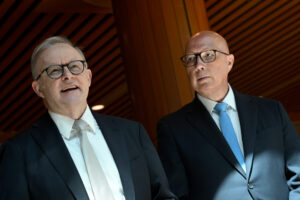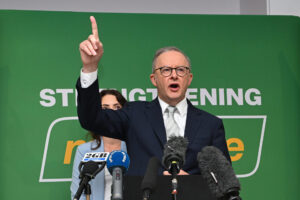The ruling mantra once was user pays, but now laws requiring mining companies to clean up their mess are derided.
Where have all the economic rationalists gone? Back in the 1980s and ’90s most conservative politicians and businesspeople were obsessed with expanding the “user pays principle” to all areas of government service, but these days you can barely find a Liberal MP who supports companies cleaning up their own mess.
Last week the Queensland government announced new laws to prevent the mining and minerals processing industries from leaving the taxpayer to pick up the tab for cleaning up the toxic mess left by failed mines or processing plants such as Clive Palmer’s nickel refinery. Once upon a time the economic rationalists would have cheered the Queensland government’s approach to “user pays” designed to protect the taxpayer. Once upon a time the economic rationalists would have demanded such measures to ensure that there was a “level playing field” between industries that did make provision to clean up their mess and those that didn’t.
But those times have passed. Ironically, the faith that economic rationalists placed in self-interest has led us to a public debate dominated by those who are paid to promote the interests of individual companies or industries. According to the Queensland mining industry, the idea of protecting taxpayers from the failure of firms to manage their own affairs was “unprecedented”.
The mining industry has a long, if not proud, history of walking away from old mine sites without either filling in their holes or cleaning up their sites. The estimated 50,000 abandoned mines dotted across our continent impose costs on the taxpayer as enormous as the holes the miners leave behind.
With all the alleged concern about the need to cut public spending and protect future generations from unfunded liabilities (anyone remember the Intergenerational Report?), you would expect that the economic rationalists would be on the warpath about the taxpayer subsidy implicit in the willingness of government to clean up the miner’s mess. You might even expect that the NSW and West Australian governments would be under pressure to protect their taxpayers in the same way that minister Steven Miles has in Queensland. Don’t hold your breath.
SILENCE ON SUPERANNUATION TAXATION
It’s not just the mining industry that scares the economic rationalists, they live in fear of all powerful industries. The debate about the taxation of superannuation provides another clear example of strategic silence.
From July next year low-income earners in Australia will pay more tax on their compulsory superannuation than they do on their ordinary income, while high-income earners pay far less tax on their superannuation contributions than they do on their ordinary income. Those earning below $18,200 will soon pay 15 per cent more tax on their super than they do on their meagre incomes.
According to Treasury, tax concessions on superannuation not only cost the budget around $35 billion in foregone revenue each year, the bulk of those concessions go to people who are so wealthy that they were never even going to be eligible for the age pension. But despite the inequity and inefficiency of a scheme that delivers a fortune to the wealthy and punishes the poor, there is no so much as a whimper of concern from the economic rationalists.
Of course, the clearest evidence of the complete surrender of the economic rationalists is the issue of carbon pricing. The idea that the taxpayer or the environment should provide free waste disposal services to coal-fired power stations would have once enraged the bulk of economists and business leaders in Australia. The idea of using a tax to discourage carbon pollution would have once been no more controversial than using a tobacco tax to discourage smoking. But that was long ago.
Economic rationalism has given way to corporate boosterism in Australia. The idea that what is good for a company, or good for an industry, must be good for the economy is as absurd as its corollary that anything that is bad for a company must be bad for the economy.
The Australian economy will change considerably in the coming decades. Government policy won’t be able to prevent change, but it will be able to influence its direction and shape. Giving corporations free waste disposal, or free rein to shape our debate, is a bad idea: the kind of idea that the economic rationalists would have once raged against.
Richard Denniss is chief economist for The Australia Institute. @RDNS_TAI
[Originally published by the Australian Financial Review in print, and here: http://www.afr.com/opinion/where-have-the-rationalists-gone-20160321-gnnaly#ixzz43ZsB2XDh]
Related documents
Between the Lines Newsletter
The biggest stories and the best analysis from the team at the Australia Institute, delivered to your inbox every fortnight.
You might also like
5 ways and 63 billion reasons to improve Australia’s tax system
With a federal election just around the corner, new analysis from The Australia Institute reveals 63 billion reasons why our next Parliament should improve the nation’s tax system.
Business groups want the government to overhaul the tax system? Excellent – we have some ideas.
The landslide win by the ALP has seen business groups come out demanding the government listen to their demands despite having provided them no support, and plenty of opposition, over the past 3 years.
10 reasons why Australia does not need company tax cuts
1/ Giving business billions of dollars in tax cuts means starving schools, hospitals and other services. Giving business billions of dollars in tax cuts means billions of dollars less for services like schools and hospitals. If Australia cut company tax from 30% to 25% this would give business about $20 billion in its first year,


